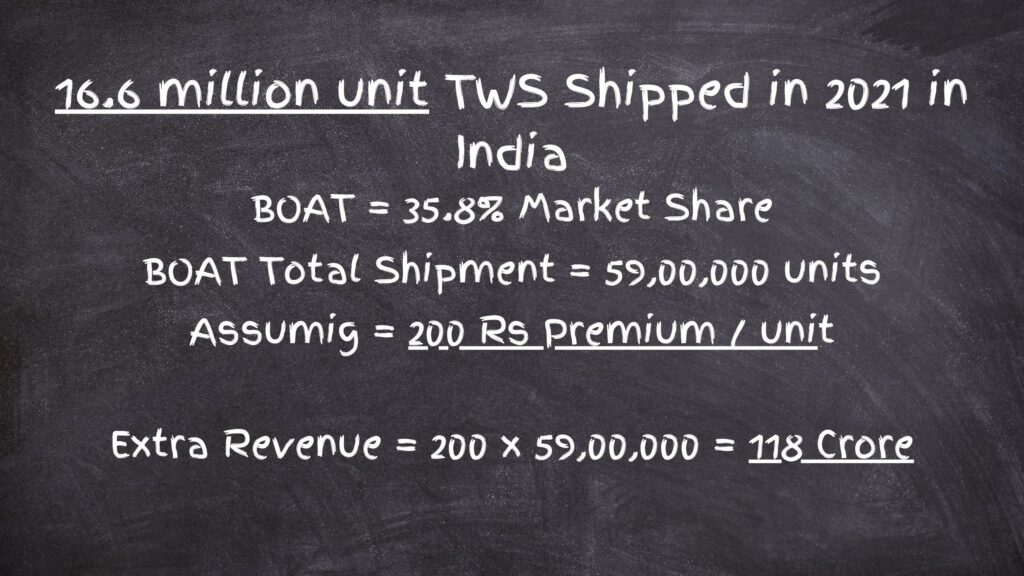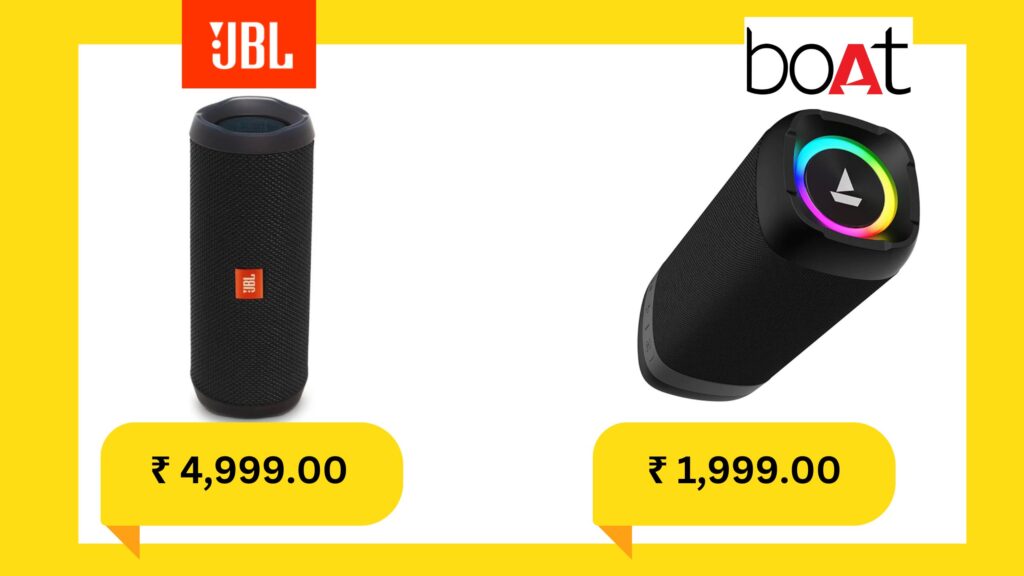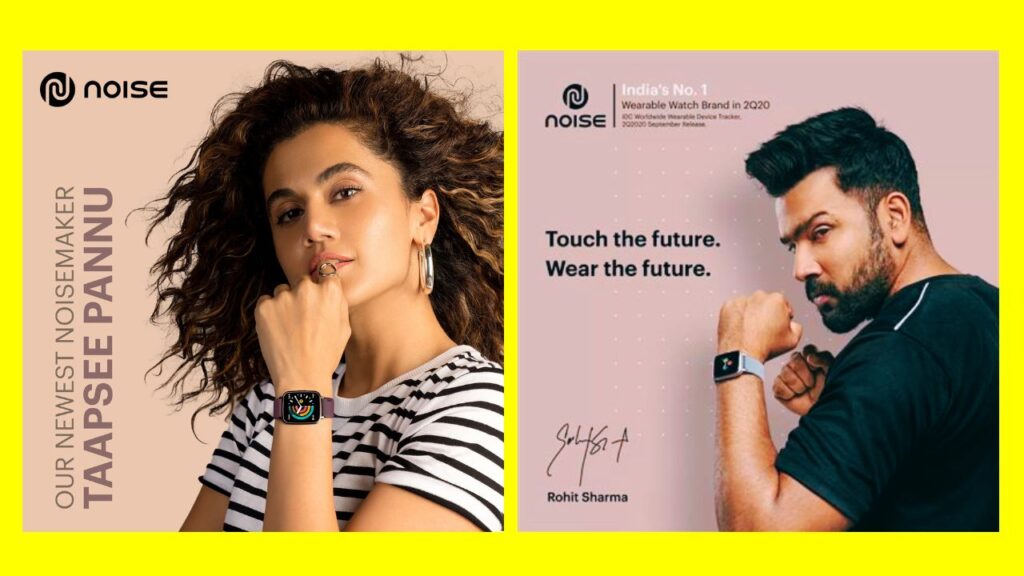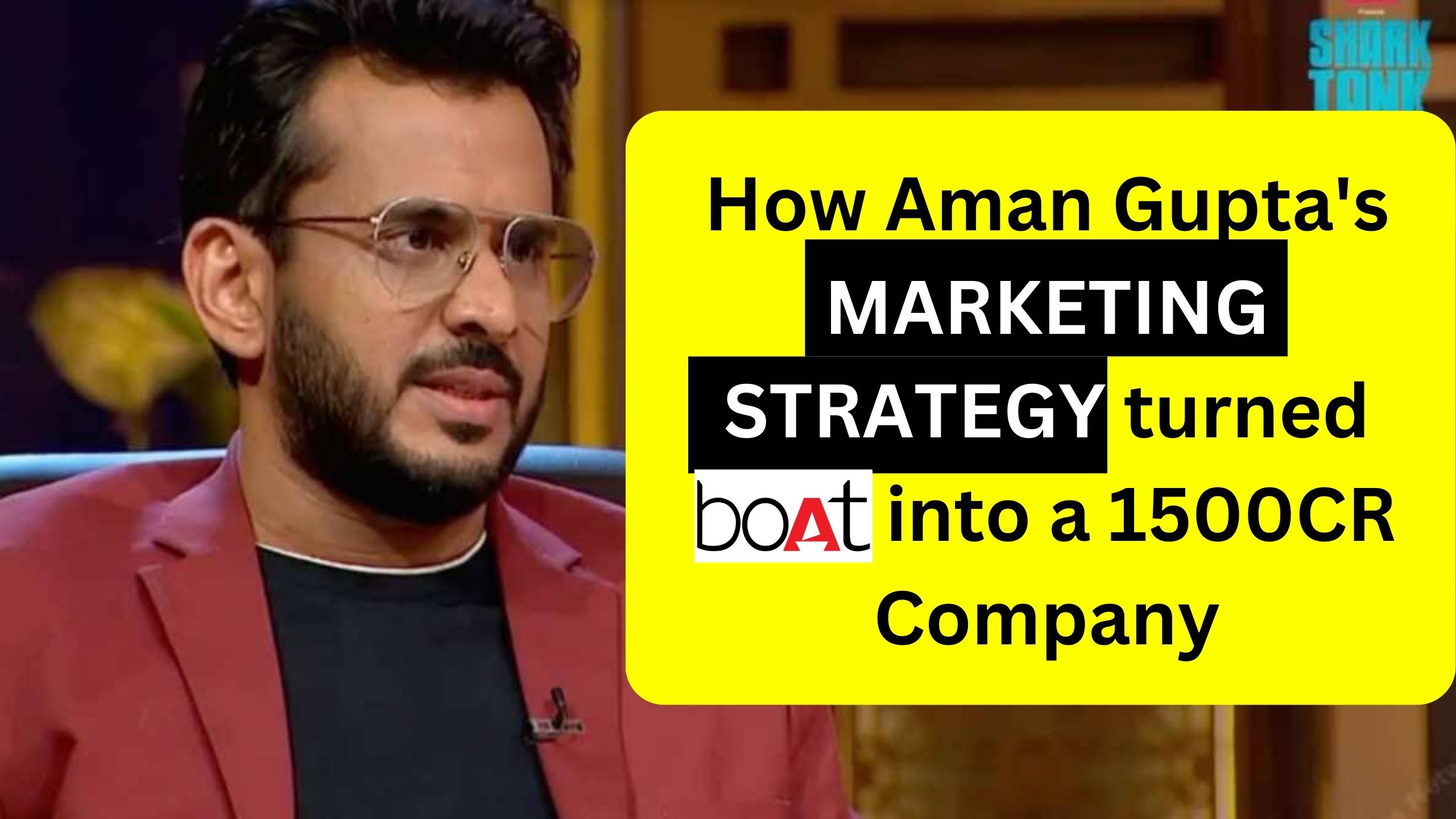The boat is one of the most incredible brands in the Indian startup ecosystem. The most astonishing thing about this company is that within just five years they have achieved such a strong position in the market, that if you look at TWS or the true wireless stereo market as of Q3 of 2021.

While bolt stands at 5.3%, Noise stands at 7.7%, Realme stands at 8.1%, and Boat stands way ahead with a market share of 35.8%. Which is literally more than the next three competitors combined. On top of that, the revenue of the company has already crossed 1500 Crores in FY2021. The profits have already shot up by 61% since Fy2020. Considering the fact that Boat is now going for an IPO.
The question is
- How did Boat achieve such an extraordinary position in the crowded wearable market of India?
- What exactly was their business strategy?
- What are the business lessons that we need to learn from Mr. Aman Gupta & his wonderful team at Boat?
Genius Market positioning
One of the most important reasons for its success is its genius market positioning. If you look at the rise of Boat it is very very similar to the rise of Oneplus phones in India. Many of you must have seen that there was a time when the Oneplus brand was just one of the most functional underrated brands in India. And, it is only popular among tech enthusiasts. But suddenly with the launch of Oneplus 7 the Oneplus tag became one of the most popular brands in India. You could literally see Oneplus 7 phones everywhere in 2019. Infact at one point in 2019, Oneplus was selling more phones than Apple and Samsung combined. Now the question is in spite of the phone market being so crowded with Vivo, Oppo, Samsung, Huawei, and Apple.
How did Oneplus Become a Legend?

The answer to this question lies in this pricing chart. If you look at the pricing of phones in India back in 2019. You will see that iPhone was the costliest with pricing of 85,000 rupees, then we had the Samsung s10 priced at 55,000+ rupees, and then straight away we had Oppo Vivo and other companies that were primarily focused on selling phones below 25,000 rupees.
Although they had costlier phones in India the focus of these companies was more on 25,000 rupees and below that price range. Now you see there is a huge gap that left out between 25,000 rupees to 55,000 rupees which were only being addressed by Samsung. As we all know Samsung phones do not offer as much as value for money as their counterparts. This audience was the most premium unaddressed and more importantly a large audience that was left untapped. Here’s where we saw the rise of two phones.
Xiaomi Mi 9 at 31,000 rupees and Oneplus 7 was priced at 35,000 rupees. Both these phones positioned themselves exactly in between the 25 to 55,000 rupees price range. They both had insane specs and offered way more value for money as compared to Samsung phones.
Now the question is
Why didn’t MI 9 become a market leader like Oneplus?
That is because Oneplus built a crazy level of aspirational value for its brand. Because of getting endorsed by none other than Robert Downey Jr. himself.
Now I don’t know how many of you noted this but then in the exact same year, the Avengers Endgame hype was at its peak. Because when Endgame was about to release in 2019. And everybody knows what an insane fan base Robert Downey Jr. has in India. This aspirational value is something where Xiaomi lagged because of this Oneplus won a huge market share in India in 2019.
I’m not saying that everyone bought Oneplus phones because of Robert Downey Jr. but the fact is that the aspirational value that Robert Downey Jr’s endorsement got to Oneplus got enough people to see Oneplus as a premium brand. Because of this, it got enough people to buy the phone. When people saw that the tech was genuinely the best that you could find in that range. It eventually led to positive word-of-mouth and hence Oneplus 7 became one of the best-selling phones in India in 2019.
Now if you own a Oneplus you must have also noticed that you actually considered buying an iPhone. But when you saw the stupendous difference between the price of Oneplus and an iPhone. Oneplus by default looked like an obvious and the most comfortable choice of all. Therefore the Oneplus brand was able to build an aspirational value in the minds of premium customers in India. Because of this, it was able to beat Xiaomi and was able to tap into those users who were premium customers but could not buy an iPhone.
How is this related to Boat and what does Oneplus position have to do with Boat
If you look closely after apple introduced the AirPods in 2016, three important things happened in the exact same year.
- There was a sudden boost in the fascination with wireless earphones
- The JIO wave hit India in 2016 which led to the skyrocketing screen time of Indians.
- Phone manufacturers stopped shipping earphones along with their smartphones. If they did these earphones were the most basic versions in the market.
All these three factors created a huge market for the wearable in India. So, from 2017-18 onwards many-many companies started jumping into the wearables market.

If you look at the pricing charts of the most popular brands in 2018. This is what it looks like. First, we had the ultra-premium wireless earphones category. Wherein we had Bose and Apple, which had a base price of 17,000 and 15,000 respectively. Then in the premium category that is between 10 to 15k. We had only JBL as a significant brand with its pod version being priced at 10,000 rupees. Then for sub-premium that is between 5000 to 10,000. We had Sennheiser’s wireless earphones, which started from 6400 rupees onwards. Below this price point that is below 5000.
There was no giant brand and yet there was a huge demand for wireless earphones in India. This is where we saw four brands come in Mivi priced at 3000 – 4000 rupees Skull Candy priced at 2,000 rupees onwards. We had Boat rockers at 1999. And then we had Noise Shots priced at 3999/-. And then we had several local brands including Bolt that was priced at 999 rupees below.
With these four competitive brands what was so special about Boat that it is now the market leader by such a huge margin?
There are two specific reasons for that. While Skull Candy was only popular among enthusiasts and a very limited segment of the audience the other brands like Mivi and Bolt were barely known in the market. Whereas Boat had become far more popular because they had roped in Hardik Pandya in 2018.
This is where the power of celebrity endorsement comes in. Just like Robert Downey Jr’s endorsement brought in an aspirational value for one plus. Hardik Pandey’s endorsement by default built an aspirational value for the boat as a brand.
As a result in the 2000 to 5000 rupees, category Boat became far more familiar than their counterparts.
Now some people might say “Just because some celebrities endorsing, why will we buy earphones? We are smart enough to make a good choice without endorsements”.
Here are some basics of marketing for you. A customer knowingly or unknowingly determines the value of a product based on two types of values.
- Tangible value
- Perceived value
1. Tangible value is the real value of the product. As in if the audio sounds great in one earphone it has a great tangible value.
2. Perceived value as the name suggests is basically the judgment that you make based on how the product is portrayed.
The fact about audio devices especially earphones is that only trained ears or people who are involved in video editing or sound editing can actually spot the intricate differences in audio. Whereas the knife ears will not be able to tell the difference in audio quality between the two devices.
As a result, you can barely spot the difference between the two products. As a result, the entire audio market from the customer standpoint is practically commoditized.
Since there is no added tangible value to the product that you can spot the only value by which you will judge an audio product like your phone is by perceived value
So if I place two earphones one of some random brand and the other that is being endorsed by Hardik Pandya, You are more likely to trust the latter than the former. Even if you are not a diehard Hardik Pandya fan. So the only delta that inclines you to purchase a product like your phone is the perceived value of the product.
Just to give you an idea about how super powerful this is. Here’s some simple math. Merely because of celebrity endorsement if Boat is able to charge an average premium of just 200 rupees extra per product.

Here’s what it looks like with 16.6 million TWS units shipped this year. And with Boat having a 35.8% market share. Boat would have shipped close to 59 lakh units. So if they got you to pay an average premium of 200 rupees per product due to celebrity endorsement. Boat has already made 118 crores extra in revenue. A fun fact is that the profit of the company in FY21 itself is 78.6 crores. This is the power of building a perceived value in a crowded commoditized market.
This is the reason why boat obsessively focuses on presenting itself as a lifestyle brand, to build an aspirational value for itself both with endorsements and design. After Hardik Pandya, they also roped in Rishabh Pant, Shikhar Dhawan, Bumrah, and Prithvi Shaw in 2019. Followed by Neha Kakar, Kiara Advani and Kartik Aryan. After that, they also signed up Shreya Shair and Diljit in 2020.
Boat also collaborated with celebrity designer Masaba Gupta to launch a limited edition collection of spunky headphones at the Lakme fashion week 2020.
Now they’re also collaborating with Bira. Which is again one of the most favorite millennial brands in India.
This is how just like Oneplus was able to present itself as a far more premium product, a far more familiar product as compared to Xiaomi MI9. Boat through its collaborations has been able to build the same aspiration value to stand out from the rest of the crowd. We also know from the jockey case study how powerful this aspirational value building is.
Boat Stone Bluetooth Speakers changed the game?

One of the most underrated reasons for Boat’s success was also the foundation they laid with an insane product called Boat Stone. These speakers are by far one of the best Bluetooth portable speakers on the market. The reason why this is such a big deal is that Boat stone became popular without celebrity endorsements or any fancy marketing strategy.

During that time while JBL flip was priced at 4999/- rupees. Boat Stone was priced at just 2199/- rupees. According to me, Boat sounded as good as JBL. This is the reason why the Boat is standing tall in spite of powerful players like Realme and Oneplus in the market. Even today at the entry-level in the earphones market Boat is still priced at a bare minimum of 299/- rupees. Because of this a student is more likely to buy a Boat. And when he loves it three years later after he graduates, when his purchase power increases. He is more likely to buy a Boat product. Whereas in the case of Oneplus the cost barrier itself is very-very high.
Now after laying a solid foundation of positioning itself as a lifestyle brand Boat is slowly expanding its price range to position itself in the upper range of 4 to 5000 rupees. It is also getting into smartwatch segment which is again a huge market to be tapped.
How Noise is using brand ambassadors?

Very interesting to note is that just like Boat created an aspirational value for wearables. After apple created a huge market for smartwatches. Noise is now getting ambassadors like Tapsi and Rohit Sharma. And is even spending a ton of money on social media campaigns to build aspirational value for its watches. This is boosting not just its watch sales but also the wearable sales. Because of this it is already the number two player in the market right next to Boat. Now the rivalry between noise and boat is something that’s going to be very very interesting to watch.
This is how building a quality product, choosing a wonderful time to enter the market, standing out from the rest of the competition through lifestyle marketing, and strategic collaborations. Aman Gupta and the team have turned both into a market leaders in the wearable segment of the Indian market.
Business Lessons from Boat & Aman Gupta Strategy
There are 2 very-very important things that you need to learn from this case study.
1. Differentiate your product from others
Whenever you launch a product in a crowded market. Always try to figure out how you are going to differentiate yourself in the presence of the big guns. In this case, if someone had told Aman Gupta that “dude! There is JBL, Apple, Skull Candy, and so many other brands then what is so special about you”. Then on the outside, it almost looks like there is no room in the market. But the moment you take a pen and paper and you start noting down their price slabs. You will very clearly be able to see that the 1000 rupees to 5000 rupees slab are literally empty, and you could actually make your mark over there.
2. Use Celebrity Endorsements Wisely
Celebrity endorsements although look like a cash drain. In some cases even today it could be a game changer in a crowded commoditized market. Considering this factor I’ve got one question for you. Mivi actually had ambassadors like Carry Minati and BB ki Vines endorsing their product. right? but Boat went with Hardik Pandya, Kartik Arayan, and the rest. My question to you is do you think this difference in the choice of ambassadors made a difference? If yes then tell me why in the comments section.
Do you Know How Cred Make Money & What are their strategies
Study Material
If you find the time please read this book called Alchemy by Rory Sutherland.


1 thought on “Boat Case Study – Aman Gupta’s Marketing Strategies”